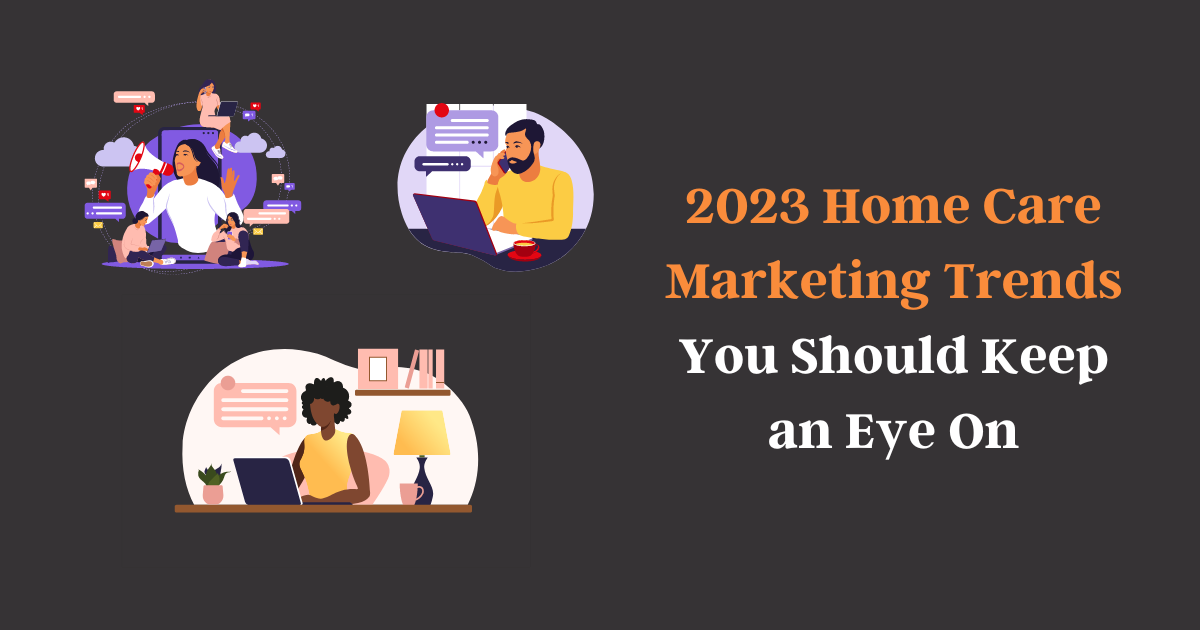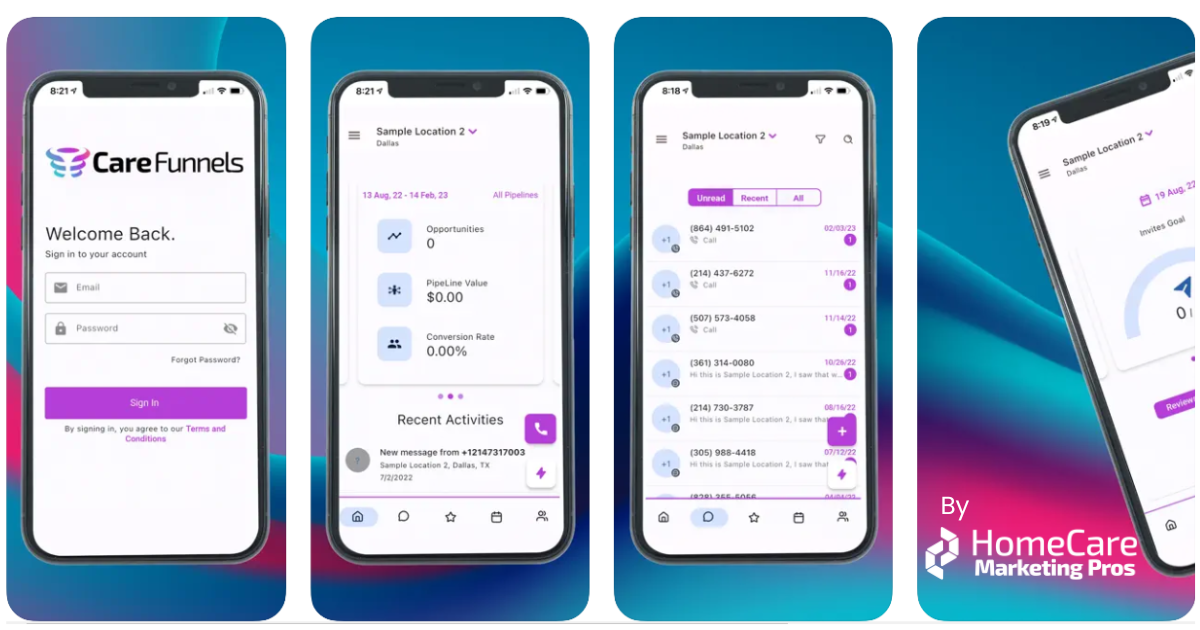2023 Home Care Marketing Trends
In 2023, healthcare consumers want personalized, tech-enabled care. As demand for in-home care increases rapidly, home care agencies have a brilliant opportunity to retain clients and reach new demographics with their marketing plans.

COVID-19 increased the popularity of in-home care. Even before the pandemic changed the way healthcare consumers engaged with providers and their own health and wellness, Deloitte predicted that healthcare would be most often delivered at home or via outpatient, virtual, and other settings. Covid-related concerns for health and safety accelerated the movement to in-home care, and consumer appetite remains strong.
In the coming year, home care agencies can expect clients to want personalized, tech-enabled care experiences that value privacy and affordability.
The demand for home care will continue to increase for the foreseeable future, and the home healthcare market is expected to surpass $2.93 billion by 2026. To keep up with ballooning demand, agencies need to quickly expand their staff, and employer branding will become a permanent part of a home care agency’s marketing strategy.
Here’s more about what home care agencies can expect in the coming year.
Client-focused, tech-enabled care
Healthcare consumers have become accustomed to the convenience of healthcare tech, like telemedicine, health tracking apps, and the Medical Internet of Things, or Medical IoT. They will expect the same ease of use and technification of their at-home care experience.
Home care agencies and marketers must remember that tech does not and cannot replace the human elements of home care. Agency services and marketing messages must reflect the desire for the balance of client-focused, tech-enabled care. Especially older generations, who may not be comfortable with tech devices and tools, need reassurance that home care is possible and just as valuable without extensive tech knowledge.
In 2023, clients will be looking for:
- Hybrid care models: In-home healthcare should come with remote complements, like virtual check-ins with home caregivers, wearable tech, remote patient monitoring, health apps, and sensor technology. Hybrid care can more easily engage clients and their family members with their health care and lead to better patient outcomes.
- Easy access to EHR: Healthcare consumers want access to their data, so in-home care should provide a tech-powered system of communication and health status tracking. This too, can lead to better patient outcomes when data can be easily self-reported and shared with home caregivers and the home care agency.
- Seamless communication with other healthcare providers: Now that healthcare data is digitized, it should be shared with clients’ other healthcare providers, like primary care doctors, outpatient centers, and hospital discharge coordinators.
- Client privacy: With all of this new tech comes the need to protect the privacy of your clients. Eighty-eight percent of consumers will stop using a personalized service if they’re not sure how their data is used. Home care marketing must address cybersecurity as well.
Cost is a concern
The cost of in-home care is a concern for consumers, and affordability must be a central part of messaging strategy.
According to the Kaiser Family Foundation, half of adults in the United States struggle to afford healthcare costs, and “substantial shares” of the 65+ demographic say it’s difficult to afford services not covered by Medicare. Home care can cost a client between $20,000 and $108,000 annually. Considering that the median household income is $90,000 in 2022, that puts home care out of reach for many.
The cost of at-home care is projected to increase over the coming decades, and by 2050, it’s estimated to cost almost $60 per hour, a 50% increase over today’s average.
However, home care agencies can play an active role in meeting cost needs and guiding clients through insurance and medicare processes. Home care agencies need to take a helpful and proactive stance on affordability in their marketing by:
- Integrating affordability into top-of-funnel marketing
- Providing cost calculators
- Creating Medicare and Medicaid guides for prospective clients
Personalization of care
The ubiquity of technology means personalization of care. Consumers have grown accustomed to tech of all kinds that serves—even anticipates—their needs, like wearable devices, retail delivery, streaming services, and basic online shopping. According to a survey by CITE Research Dassault Systèmes, 83% of consumers expect products or services to adapt to their tastes in a matter of moments or hours.
Consumers now expect personalization of their healthcare as well, especially as it applies to in-home care, and are willing to pay 15.3% more for personalization.
Personalization of home care marketing looks like:
- Messages carefully targeted to specific consumer concerns
- An emphasis on customization options and individual care plans
- Using marketing AI to target demographics with very specific needs
- Using tech to schedule appointments and in-home care
- Virtual check-ins with caregivers and aides
- Digital integration and coordination of in-home care with clinical healthcare
Keep in mind that personalization must be balanced against privacy and that clients who feel their personal data is used irresponsibly are likely to abandon care.
Location-based marketing, with a focus on the suburbs
Aging Baby Boomers and increased life expectancy means there will be more people with more care needs. About 75% of Americans age 50+ would like to stay in their current homes or communities for as long as possible, according to AARP.
Personal preference plus the ubiquity of remote healthcare makes it even more likely that seniors will stay put. Home care agencies will be wise to emphasize the benefits of aging in place and their ability to integrate with other medical services and wearable devices for hybrid delivery of care.
In-home care will be in demand among more than just the aging U.S. population. According to AARP, adults of all ages are drawn to aging in the suburbs. Those in rural areas and small towns say they want to remain in that kind of community, and adults in urban areas say they are more open to going to the suburbs or country settings.
Agencies that can attract the under-65 demographic for services like post-operative care and even in-home pediatric care can cultivate a long-term client base.
The importance of wellness
Healthcare is now more than health. Consumers are increasingly interested in wellness—the idea that one can thrive physically, mentally, and emotionally.
Consumers want home healthcare that is holistic in its approach. Potential clients want to see home care that considers body and mind. Agencies will do well to build messaging around:
- The value of non-medical home care
- Benefits of senior companion care on mental health
- Transportation services to social events to get seniors and those with disabilities out of the house and into the community
- Habilitation care for people with disabilities and those on the Autism spectrum to combat the prolonged isolation of the last two years
Recruitment marketing is no longer a nice-to-have
Though the hiring shortage is leveling out in some industries, there remains a deficit of home health caregivers. According to PHI, the direct care industry will need to add 7 million new workers by 2028 to keep pace with demand.
Recruitment marketing is now a necessary part of home care agency marketing.
- Focus on the employee experience: Healthcare workers want better work-life balance, more flexibility, better compensation, career advancement opportunities, and meaningful recognition of their contributions.
- Diversity of caregivers matters: When patients share a racial identity with their healthcare provider, it can improve patient outcomes.
- Workers want learning and development opportunities: Attract new talent and retain current staff by giving them ample opportunity to add skills. Ninety-four percent of caregivers say “access to further education is an important consideration in accepting a job offer,” and 85% say they’re “more likely to stay with their current employer if offered resources to further their education.”
- Give them the tech tools they need: Provide better EHR tools and training so caregivers can report patient outcomes quickly and easily and focus on client care.
- Provide a supportive workplace for weary healthcare workers: Home care can provide a flexible alternative to hospitals and clinical environments. As staff leave in search of healthier workplaces, home care agencies can provide the support and work-life balance burnt-out healthcare workers need.
Get started with your 2023 home care marketing plan!
Ready to start 2023 off right with a new approach to your home care marketing strategy? See how Home Care Marketing Pros can lend a hand! Our unique blend of digital marketing solutions is here to help you grow your agency and keep up with new trends. Get started with a 30-minute, no-obligation, Discovery Call!












